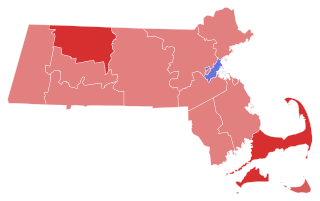
The 1964 United States Senate elections were held on November 3. The 33 seats of Class 1 were contested in regular elections. Special elections were also held to fill vacancies. They coincided with the election of President Lyndon B. Johnson by an overwhelming majority, to a full term. His Democratic Party picked up a net two seats from the Republicans. As of 2023, this was the last time either party has had a two-thirds majority in the Senate, which allowed the Senate Democrats to override a veto, propose constitutional amendments, or convict and expel certain officials without any votes from Senate Republicans. However, internal divisions would have prevented the Democrats from having done so. The Senate election cycle coincided with Democratic gains in the House in the same year.

David Ignatius Walsh was an American politician from Massachusetts. A member of the Democratic Party, he served as the state's 46th governor before winning election to several terms in the United States Senate, becoming the first Irish Catholic from Massachusetts to fill either office.

The 1960 Republican National Convention was held in Chicago, Illinois, from July 25 to July 28, 1960, at the International Amphitheatre. It was the 14th and most recent time overall that Chicago hosted the Republican National Convention, more times than any other city.

The 1936 United States Senate election in Massachusetts was held on November 3. Incumbent Democratic Senator Marcus A. Coolidge declined to stand for re-election. Republican Henry Cabot Lodge Jr. won the race to succeed him over Democratic Boston mayor James Michael Curley and former Suffolk County prosecutor Thomas C. O'Brien.

The 1962 United States Senate special election in Massachusetts was held on November 6, 1962. The election was won by Ted Kennedy, the youngest brother of then-President John F. Kennedy, who would remain Senator until his death in 2009.

The 1952 United States Senate election in Massachusetts was held on November 4, 1952, in which Incumbent Republican Henry Cabot Lodge Jr. lost to Congressman and future President John F. Kennedy, the Democratic Party nominee.

The 1940 United States Senate election in Massachusetts was held on November 5, 1940, with Democratic incumbent David I. Walsh defeating his challengers.

The 1926 United States Senate special election in Massachusetts was held on November 2, 1926.

The 1916 United States Senate election in Massachusetts was held on November 7, 1916. Republican incumbent Henry Cabot Lodge defeated Democratic Mayor of Boston John F. Fitzgerald to win election to a fifth term.

The 1922 United States Senate election in Massachusetts was held on Tuesday, November 7. Incumbent Republican Senator Henry Cabot Lodge was re-elected to a fifth term in office over Democrat William A. Gaston.

The 1944 United States Senate special election in Massachusetts was held on November 7, 1944. Republican Governor Leverett Saltonstall was elected to finish the term of Henry Cabot Lodge Jr., who had resigned from the Senate to serve in World War II.

The United States Senate election of 1942 in Massachusetts was held on November 3, 1942. Republican incumbent Henry Cabot Lodge Jr. was re-elected to a second term in office over Democratic U.S. Representative Joseph E. Casey.

The United States Senate election of 1924 in Massachusetts was held on November 4, 1924. Incumbent Democratic Senator David I. Walsh, first elected in 1918, ran for a second term in office but was defeated by the Republican nominee incumbent Speaker of the U.S. House Frederick H. Gillett. Despite winning 13 out of 14 counties in the state, Gillett was only able to win a narrow margin of 1.7%, which was largely due to Walsh's strong performance in Suffolk County, home to the state capitol of Boston, likely being carried over by fellow Republican Calvin Coolidge's strong performance in the 1924 United States presidential election.

The 1944 Massachusetts gubernatorial election was held on November 7, 1944. Incumbent Republican governor Leverett Saltonstall did not run for reelection, choosing instead to run in the United States Senate special election to succeed Henry Cabot Lodge Jr. In the open race to succeed him, Democratic mayor of Boston Maurice J. Tobin defeated Republican lieutenant governor Horace T. Cahill.
A Massachusetts general election was held on November 4, 1952 in the Commonwealth of Massachusetts. Primary elections took place on September 16.
The 1948 Massachusetts general election was held on November 2, 1948, throughout Massachusetts. Primary elections took place on September 14.
The 1946 Massachusetts general election was held on November 5, 1946, throughout Massachusetts. Primary elections took place on June 18.

The 1907 Massachusetts gubernatorial election was held on November 5. Incumbent Republican Governor Curtis Guild Jr. was re-elected for a third one-year term.
The 1944 Massachusetts general election was held on November 7, 1944, throughout Massachusetts. Primary elections took place on July 11.
The 1942 Massachusetts general election was held on November 3, 1942, throughout Massachusetts. Primary elections took place on September 15.


















